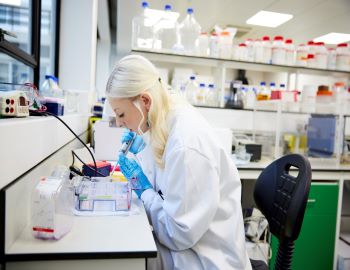
Did you know that from the amount of blood taken in a routine blood test it is possible for researchers to create ‘mini-lungs’ to study lung diseases in a dish in the laboratory? This is research that the Cystic Fibrosis Trust is funding at the University of Cambridge, thanks to the ongoing support of AJN Steelstock.
Studies in the ‘mini-lungs’ will help researchers develop tailored treatments for people with cystic fibrosis. They’re also the first step in developing ways to repair their damaged lungs.
Cystic fibrosis (CF) is an inherited condition that affects approximately 10,500 people in the UK. It causes the lungs not to work properly, also affecting other parts of the body too. It is harder for people with CF to breathe and get the oxygen their body needs. They’re also more likely to get chest infections, often triggering hospital stays of several weeks at a time. These problems are caused by the lining of the lungs being thicker and stickier than normal.
Taking blood cells back to basics
To design new drug treatments suitable for every type of CF, a really good understanding of how lung cells are going wrong is required and world-leading researchers working as part of the Cystic Fibrosis Trust’s Innovation Hub in Cambridge have been fine tuning a new method– using blood samples from people with CF as their starting material!
“We are delighted with the progress that has been made in the Innovation Hub”, commented Janet Allen from the Cystic Fibrosis Trust.
“These mini-lungs will allow us to test for individual responses to drugs which takes into account person to person variation, ultimately tailoring treatment to each person with cystic fibrosis. In the long term, delivering stem cells to the lungs could be way of repairing damaged lungs.”
























































































